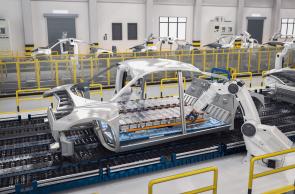Enabling technology for the e-mobility sector
One of the most future-oriented and fast-paced industries, the automotive sector is undergoing substantial change. E-mobility trends and fierce competition are requiring car manufacturers to redesign their existing production lines to accommodate new models with electric powertrains while maintaining the speed and flexibility required to quickly deliver vehicles that capture customer imaginations, driving sales and profitability. To overcome these challenges, players across the automotive supply chain, from battery producers to manufacturers’ car assembly plants, need to leverage large volumes of data from a variety of sources to run highly responsive facilities and deliver high-quality, reliable products.
John Browett, General Manager at the CC-Link Partner Association (CLPA), looks at how Time-Sensitive Networking (TSN) can support the e-mobility value chain in this dynamic landscape.
E-mobility has become the key challenge in the automotive and lithium-ion battery (LIB) industries to support global decarbonisation trends and ensure future survival. The shift from traditional internal combustion engines to electric powertrains necessitates major adaptations in the automotive and battery production sectors. In particular, existing production systems, even if well-established, need to be reshaped to address the manufacturing of completely new platforms that will form the basis of future model ranges. To do this, more responsive, effective and agile operations are required.
Electric vehicle (EV) and LIB manufacturers face a number of challenges. They should scale up production to meet rising demands. Companies also need to strike a delicate balance between delivering high-quality products and maintaining the shortest cycle times while reducing costs. Furthermore, they need to optimise energy and resource efficiency while ensuring the level of flexibility required to customise their solutions.
How electrification is changing the automotive and battery landscapes
To address these challenges while advancing their competitiveness in the digital era, players across the automotive supply chain need to get the most out of the data generated from their operations while maximising the speed to transfer key information.
Battery production and car assembly plants, in particular, handle large volumes of real-time traffic from various shop floor and supervisory systems. These are necessary to support effective processes and ultimately the delivery of high-quality products. Data sharing between processes on a manufacturing line or with IT systems is of particular importance in order to coordinate multiple activities in the most efficient, effective way to deliver the shortest cycle times.
In addition, as factories become smarter, more devices and data processing tools are being added to communication networks for monitoring and decision-making purposes that optimise processes. These also include nodes that do not typically belong to the operational technology (OT) domain, such as software solutions from the information technology (IT) realm.
The power of TSN for the e-mobility value chain
Time-Sensitive Networking, or TSN, is a network technology designed to advance industrial Ethernet communications. As such, it presents a game-changing solution to address the challenges faced by manufacturers across the entire EV value chain.
Firstly, TSN allows control over transmission delays, jitter and latency, ensuring deterministic real-time operation, hence, tight management of cycle times and therefore productivity. Secondly, by including IEEE 802.1 standards for synchronisation and queuing, it provides the foundation for convergent network architectures. This is especially important, as it means previously separate networks and their traffic can now be combined into a single one. As a result, a significant increase in the transparency of processes can be achieved, and therefore the ability to optimise them in the most effective way.
A converged architecture also provides the opportunity for simplified expansion of networks, providing the opportunity to integrate more automated setups, robotics, sensors and many more devices. By doing this, manufacturers can create more agile, responsive, and productive operations.
The ability to handle large volumes of data from disparate data sources also means that TSN is crucial for merging IT and OT traffic. This opens up multiple opportunities, such as tighter integration between the IT world and the shop floor. Therefore, it is possible to set up smarter operations that leverage artificial intelligence (AI) for predictive maintenance, quality control and other data-based activities.
Kickstart your TSN-capable applications
The integration of TSN in industrial communications offers a transformative solution to the key challenges experienced by manufacturers across the e-mobility value chain, especially LIB and EV producers. Embracing TSN will undoubtedly help drive the transition to a greener and more sustainable automotive future, delivering high-quality, customisable EVs at high speed to meet increasing demands.
Companies interested in adopting TSN can do so now by choosing CC-Link IE TSN, the first open industrial Ethernet that combines gigabit bandwidth and TSN functions. By selecting this technology, users can benefit from a broad and fast-growing range of compatible industrial automation products from leading vendors. As a result, they can create highly effective, future-oriented systems to enhance communications and data-driven operations, ultimately driving their competitiveness.
About The CC-Link Partner Association (CLPA)
The CLPA is an international organisation founded in 2000 dedicated to the technical development and promotion of the CC-Link family of open automation networks. The CLPA's key technology is CC-Link IE TSN, the world's first open industrial Ethernet to combine gigabit bandwidth with Time Sensitive Networking (TSN), making it the leading solution for Industry 4.0 applications. Currently the CLPA has over 4,200 member companies worldwide, and more than 2,800 compatible products available from over 380 manufacturers. Over 40 million devices using CLPA technology are in use worldwide.
Further Information:
Website: eu.cc-link.org
LinkedIn: https://www.linkedin.com/company/cc-link-partner-association-europe/
Twitter: twitter.com/cc_linknews
YouTube: youtube.com/user/CLPAEurope
Press contact:
CC-Link Partner Association Europe
John Browett
General Manager
Tel.: +44 (0) 7768 338708
john.browett@eu.cc-link.org
PR agency:
DMA Europa
Anne-Marie Howe
Progress House, Great Western Avenue, Worcester, WR5 1AQ, UK
Tel.: +44 (0) 1905 917477
anne-marie.howe@markettechgroup.com
news.dmaeuropa.com

Enabling technology for the e-mobility sector.
- Ассоциация Партнеров CC-Link (CLPA)
Сайт членов партнерской ассоциации 







